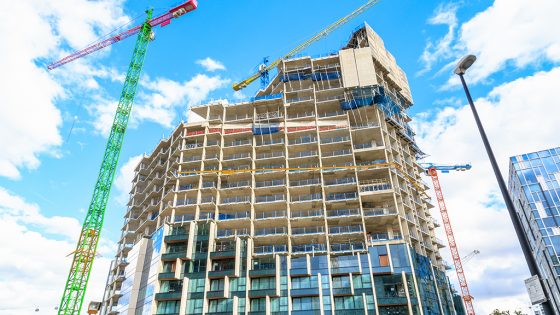The new Building Safety Regulator (BSR) had by the end of June extended nearly half of high-rise refurbishment applications beyond the eight-week time limit, a minister has revealed.
In a written answer to parliament, building-safety minister Rushanara Ali also revealed that the BSR rejected more than two-fifths (42 per cent) of the applications it had received at that point.
Since April this year, the BSR has taken on responsibility to approve construction plans for higher-risk buildings (HRBs) before work can start. An HRB is a building taller than 18 metres or seven storeys that contains at least two residential units.
The BSR has a statutory timeframe of eight weeks to determine refurbishment applications, and 12 weeks for new-build applications.
When asked about the number of HRB determinations by Labour MP Jenny Riddell-Carpenter, Ali said that by 30 June, the BSR had agreed extensions for 271 out of 606 applications to refurbish an HRB (45 per cent).
Only 12 applications had been decided within the statutory timeframe – less than 5 per cent of those that the BSR had acted on at that point.
The BSR had not taken action on 335 applications, although many are likely to have been submitted less than eight weeks before the cut-off date in Riddell-Carpenter’s request.
For new-build applications, the BSR agreed 22 extensions, in comparison with four determinations, within the statutory 12-week timeframe.
Out of the 606 applications, 260 were refused. She added that applications may be invalidated, rather than formally refused, when an applicant has not provided basic documentation demonstrating compliance with the building regulations. The BSR has previously warned that the majority of applications lack “basic information”.
In addition, the BSR had neither issued nor refused any building assessment certificates (BACs) by the end of June, despite receiving documentation for 230 applications. Under new post-Grenfell regulations, the BSR can request BACs, containing detailed information about how building owners manage critical safety risks, for certain high-rise residential buildings.
Buildings currently prioritised for a BAC include those clad with combustible aluminium composite material or built using large panel systems.
A BSR spokesperson said the regulator was “continuing to identify areas where we can stabilise and improve the new building-control approval process for higher-risk buildings”.
They said the BSR had put in “operational contingency measures” after an unexpected increase in applications, which led to processing delays.
They added: “While in part this backlog has been due to an unexpected increase in applications coming into BSR, we are also experiencing high numbers of applications which are incomplete or are unclear, making them unsuitable for approval.”
The spokesperson added that, as of 16 September, the BSR has invalidated or rejected more than 40 per cent of 808 applications for HRB building-control approval because they were incomplete or failed to demonstrate full compliance with building regulations.
They said: “Applications that are invalidated and rejected still require much of the same process and resources as those which are validated and approved.
“Clear and comprehensive applications enable us to make informed decisions more quickly, reducing the risk of delays and ensuring compliance with building-control standards.”
Ali said: “Our expectation is that once the new requirements, systems and processes bed in and all parties get used to the building-safety regulations, that timelines for processing applications are met much faster.
“The BSR has been building capacity and developing [its] operational functions to improve building safety and ensure we never see a repeat of the Grenfell tragedy.”

